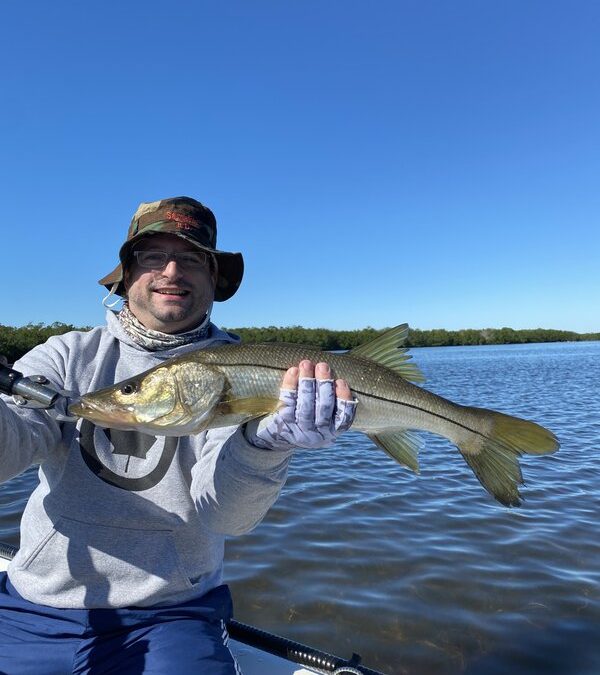Finally, its transition time around the harbor, we’re heading into spring. The winter pattern of working deep into the back country and around sand holes on low tides out on the flats is about to change. We’ll still get to deal with the wind, but warmer air and water temperatures should begin to bring the bait in from offshore and the fish will get aggressive. It’s not unusual to see a good cold snap in March, but overall, it’s a big change from the past two months.
Typically, I still like spending some time working around shorelines adjacent to backcountry creek systems but I’ll begin looking around outer islands closer to the outside. As the month progresses I’ll spend more and more time on the outside. Keep in mind, the first place the scaled sardines or “whitebait” show up are on the best grass flats closest to the passes.
After a cool couple months, the snook will also begin to make their way out of these creek systems. With the higher tides of spring they’ll work their way to some of these outer shorelines and will need to put on some weight after the slim pickings of winter. Shorelines with some adjacent deep cuts and drops are always prime habitat.
Many of the bays, sounds, and flats that surround the harbor will be holding redfish and spotted sea trout. They’ll also be looking to fatten up a bit. So, I’ll be throwing some larger baitfish patterns with profiles to match the scaled sardines. I also like larger 4 inch soft plastic paddle tail baits and first thing in the morning who doesn’t like throwing a good old top water plug. It’s that time of year.
Towards the end of the month, it’s even possible to see some tarpon show up in the upper harbor. These are resident fish that come out of the rivers. Generally, April is prime for this bite, but if it’s warm enough, late March could be good.
Cobia will also begin to appear around the bars that surround both the east and west walls. I like to pole or run the trolling motor down the outside edge and look for groups of cow nose rays as it’s not unusual to find the cobia close behind. In addition, these bar structures also should still be holding some pompano. Hard bottom is the key and I’ve found them up and down both the east and west walls on any given day. I’ve also run into them inside Boca Grande Pass just across the intracoastal on the Cayo Costa side. Moreover, it’s not unusual to run into a school of hard fighting jacks anywhere around these bar systems.
The sheepshead bite should still be strong anywhere there is structure. The Boca Grande and Placida trestles are very popular as is the artificial reef off Alligator Creek. On windy days, some live shrimp thrown up under any canal system dock can make for a good time. The Punta Gorda and Port Charlotte canals hold good numbers.


Recent Comments